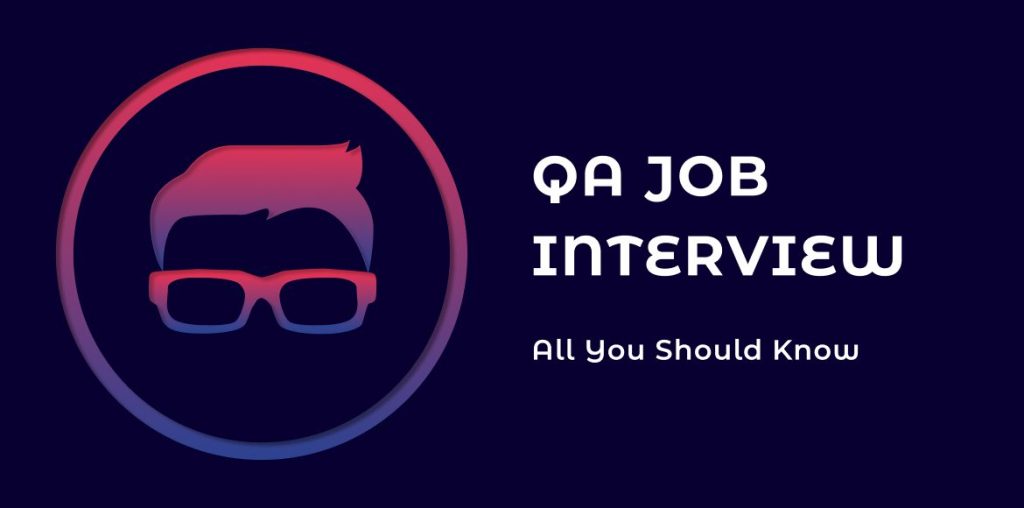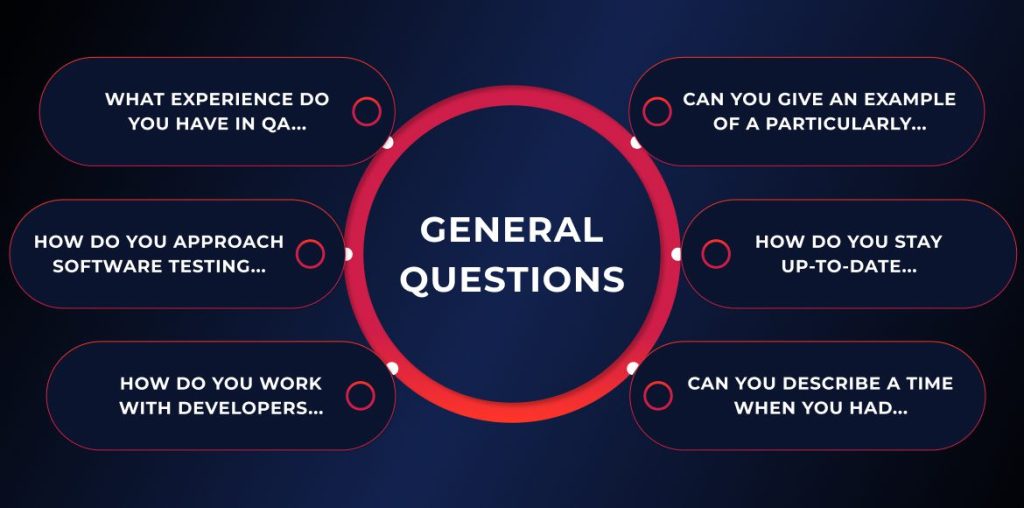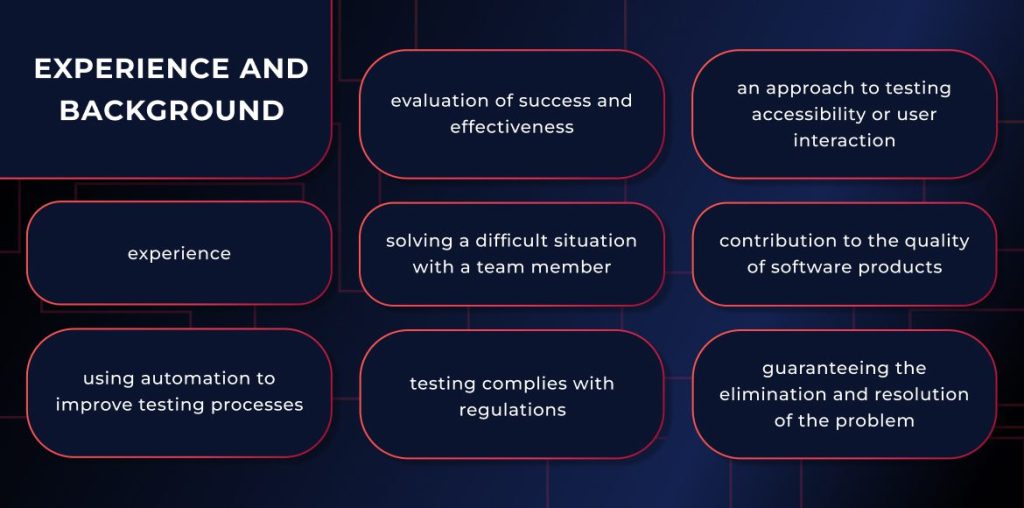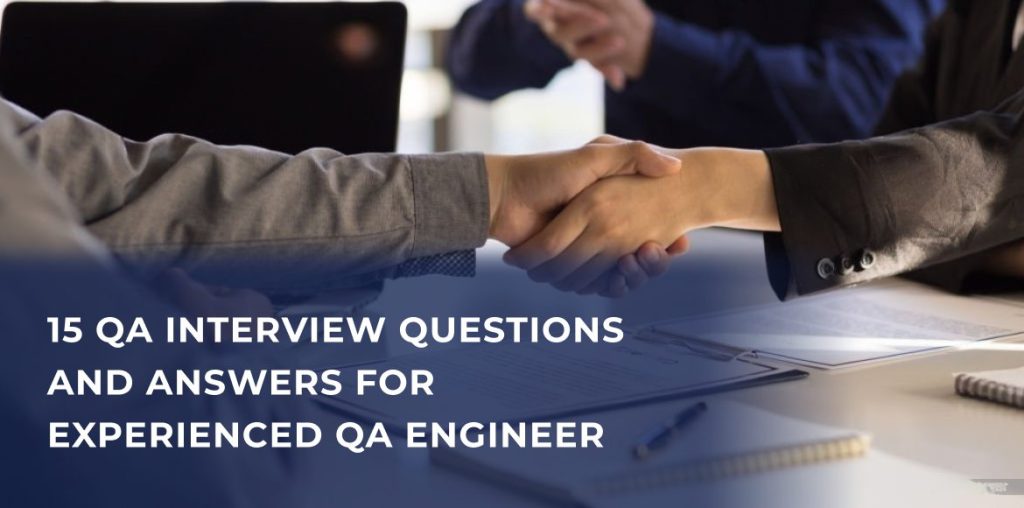QA Job Interview: All You Should Know
When getting ready for a job interview in Quality Assurance, it's important to have an understanding of what to anticipate and how to prepare. In this blog post, we'll cover everything you need to know about the QA job interview process, from preparing for the interview to demonstrating your skills and answering common QA interview questions. With the help of our tips and advice, you'll be better equipped to succeed in your next QA job interview.
What You Should Know About QA Interviews
A QA position is a critical role in SDLC (Software Development Life Cycle). A QA software engineer is responsible for ensuring that software meets the highest standards of quality, functionality, and user experience. This involves developing and implementing testing strategies, identifying and reporting bugs and issues, and working closely with developers to resolve them. In this blog post, we'll provide you with an overview of what you should know about testing engineer interviews, including what to expect during the interview process, common interview questions for QA, and tips for success.

General Questions
- What experience do you have in QA, and what led you to pursue a career in this field?
- How do you approach software testing and identify potential issues or defects in software?
- Can you give an example of a particularly challenging bug or issue you've encountered and how you went about resolving it?
- How do you work with developers and other stakeholders to ensure that software products are meeting the required quality standards?
- What manual QA tools and methodologies are you familiar with, and which do you prefer to use?
- How do you stay up-to-date with new QA trends and technologies?
Can you describe a time when you had to communicate complex technical issues to non-technical stakeholders?

Questions about Experience and Background
- Can you tell me about your experience working with [specific type of software or technology]?
- How have you contributed to the quality of the software products you've tested in your previous roles?
- Can you describe a time when you worked on a project that required collaboration across multiple teams or departments?
- How do you keep track of defects and issues you find during testing, and how do you ensure they are addressed and resolved?
- Can you describe a time when you had to handle a difficult situation with a team member, stakeholder, or customer, and how you resolved it?
- How do you ensure that your testing is compliant with regulatory or industry standards, if applicable?
- Can you provide an example of how you have used automation to improve your testing processes or efficiency?
- What experience do you have with performance testing or security testing, and how have you approached these types of testing in the past?
- How do you approach testing for accessibility or user experience, and what tools or methodologies do you use?
- How do you measure and report on the success and effectiveness of your testing efforts?

20 Basic QA Interview Questions and How To Answer Them
- What do you know about Quality Assurance?
Answer: Quality Assurance is a process that ensures that a product or service meets the required standards of quality. It involves testing and verifying that the product meets the expected requirements and specifications.
- What experience do you have with testing?
Answer: Provide a summary of your experience with manual testing, automation testing, or both. Highlight any specific types of testing that you have experience with, such as functional testing, performance testing, or security testing.
- What types of testing methodologies are you familiar with?
Answer: Explain your understanding of common testing methodologies, such as Agile, Waterfall, Verification and Validation, Incremental, Spiral, Extreme Programming. Be specific about the testing methodology you are most comfortable with and why.
- Can you describe a time when you identified a bug or defect?
Answer: Provide a specific example of a bug or defect you identified, how you found it, and how you went about resolving it. Describe the impact the bug had on the software product and how you communicated the issue to the development team.
Want to develop a custom software solution?
- What tools and technologies are you familiar with?
Answer: Describe your familiarity with specific testing tools and technologies, such as JIRA, TestRails, Selenium, or Appium. Highlight any certifications or training you have in these tools.
- How do you handle tight deadlines?
Answer: Explain your approach to prioritizing testing tasks, collaborating with developers, and working efficiently to meet tight deadlines. Highlight any strategies or techniques you use to ensure quality testing while working under pressure.
- What experience do you have with test automation?
Answer: Provide examples of how you have used test automation to improve your testing processes or efficiency. Highlight your experience with specific automation tools or programming languages, if applicable.
- Can you describe a time when you had to work on multiple projects simultaneously?
Answer: Explain how you managed your time and resources to successfully complete multiple projects at the same time. Highlight any strategies you use to prioritize tasks and ensure that all projects are completed on time.
- How do you approach cross-functional collaboration with other teams?
Answer: Describe your experience working with other teams, such as developers or project managers. Explain how you communicate and collaborate to ensure that everyone is working toward the same goals and objectives.
- How do you approach testing for accessibility or user experience?
Answer: Explain your understanding of the importance of accessibility and user experience in software products. Describe your approach to testing for these factors and highlight any specific tools or methodologies you use.
- How do you ensure that your testing is effective and thorough?
Answer: Describe your approach to testing, including your testing strategy, test plan, and test cases. Highlight any specific tools or techniques you use to ensure that your testing is effective and thorough.
- How do you handle situations where requirements are unclear or incomplete?
Answer: Explain how you work with stakeholders to clarify requirements and ensure that all requirements are met. Describe any strategies you use to identify potential gaps in requirements and ensure that they are addressed.
- How do you measure the success and effectiveness of your testing efforts?
Answer: Describe the metrics you use to measure the success and effectiveness of your testing efforts, such as defect rates, test coverage, or user feedback. Highlight any specific tools or methodologies you use to track and report on these metrics.
- What experience do you have with load testing or stress testing?
Answer: Provide examples of how you have conducted load testing or stress testing in the past. Highlight any specific tools or methodologies you use to conduct these types of testing.
- How do you ensure that your testing is compliant with regulatory or industry standards?
Answer: Explain your understanding of any regulatory or industry standards that are relevant to the software product you are testing. Describe your approach to ensuring that your testing is compliant with these standards and any specific tools or methodologies you use.
- How do you communicate defects or issues to the development team?
Answer: Describe your approach to documenting and reporting defects or issues to the development team. Highlight any specific tools or methodologies you use to communicate the details of the issue and ensure that it is addressed.
- What experience do you have with mobile testing?
Answer: Provide examples of how you have conducted mobile testing in the past. Highlight any specific tools or methodologies you use to test mobile applications and ensure that they are functional and user-friendly.
- Can you describe a time when you had to work with limited resources?
Answer: Explain how you worked with limited resources, such as time, budget, or staffing, to ensure that the testing was completed successfully. Highlight any strategies or techniques you used to overcome resource limitations.
- What steps do you take to ensure that your testing is repeatable and reliable?
Answer: Describe your approach to creating test cases and test scripts that are repeatable and reliable. Highlight any specific tools or methodologies you use to ensure that your testing is consistent and accurate.
- How do you approach test case design?
Answer: Explain your approach to test case design, including your process for creating test cases, test data, and expected results. Highlight any specific tools or methodologies you use to ensure that your test cases are thorough and effective.

15 QA Interview Questions and Answers for Experienced QA Engineer
- Can you describe a time when you had to troubleshoot a particularly difficult issue?
Answer: Provide an example of a complex issue you encountered and how you resolved it. Explain your troubleshooting methodology and how you determined the root cause of the problem.
- How do you prioritize your manual testing efforts?
Answer: Explain how you prioritize manual software testing based on project requirements, risk, and potential impact on the end user. Discuss any tools or methodologies you use to prioritize your testing efforts.
- What experience do you have with automation testing?
Answer: Provide examples of how you have used automation testing to improve the testing process. Discuss any specific tools or methodologies you have experience with and how you implemented automation testing in your previous roles.
- Can you describe your experience with agile development?
Answer: Explain how you have worked in agile development environments and your approach to testing within an agile team. Discuss any QA challenges you faced and how you overcame them.
- How do you ensure that your testing is thorough and effective?
Answer: Discuss your approach to testing, including how you create test plans, test cases, and test data. Highlight any specific tools or methodologies you use to ensure that your testing is thorough and effective.
- Can you describe your experience with performance testing?
Answer: Provide examples of how you have conducted performance testing in the past. Discuss any specific tools or methodologies you have used to measure and improve system performance.
- What experience do you have with security testing?
Answer: Provide examples of how you have conducted security testing in the past. Discuss any specific tools or methodologies you have used to identify and mitigate security vulnerabilities.
- How do you approach testing for different platforms and devices?
Answer: Explain how you test for different platforms and devices, including desktop, mobile, and web-based applications. Discuss any specific tools or methodologies you have used to ensure that testing is consistent across platforms and devices.
- Can you describe your experience with test management tools?
Answer: Discuss your experience with test management tools and any specific tools you have used in the past. Highlight any features or functionalities that you find particularly useful.
- How do you ensure that your testing is scalable and efficient?
Answer: Discuss your approach to ensuring that testing is scalable and efficient, including any specific tools or methodologies you use to optimize testing processes and minimize testing time.
Want to develop a custom software solution?
- Can you describe your experience with API testing?
Answer: Provide examples of how you have conducted API testing in the past. Discuss any specific tools or methodologies you have used to test APIs for functionality and performance.
- How do you ensure that your testing is accessible and inclusive?
Answer: Explain how you ensure that testing is accessible and inclusive for users with disabilities or special needs. Discuss any specific tools or methodologies you use to test for accessibility and inclusive design.
- Can you describe your experience with test automation frameworks?
Answer: Discuss your experience with test automation frameworks and any specific frameworks you have used in the past. Highlight any features or functionalities that you find particularly useful.
- How do you stay current with industry trends and advancements in testing?
Answer: Discuss how you stay current with industry trends and advancements in testing, including any resources or professional development opportunities you use to stay informed.
- Can you describe a time when you had to make a difficult decision regarding testing?
Answer: Provide an example of a difficult decision you had to make regarding testing, and how you arrived at the decision. Discuss any risks or considerations that influenced your decision-making process.

QA Interview Tips When Applying for a QA Role
Research the company and the job role: Before applying for a QA role, research the company and the job role to ensure that you understand what the company does and what the job entails. This can help you tailor your resume and cover letter to the specific requirements of the job.
Review the job description: Thoroughly review the job description to ensure that you understand the requirements of the role. Highlight your skills and experience that align with the job requirements.
Prepare for common interview questions: Prepare for common interview questions by researching common questions asked in QA interviews and practicing your answers. This can help you feel more confident during the interview.
Showcase your experience and skills: Be prepared to discuss your experience and skills related to quality assurance, including any relevant certifications or training you have received.
Highlight your problem-solving skills: Quality assurance is all about problem-solving, so be prepared to showcase your problem-solving skills during the interview.
Emphasize your attention to detail: Quality assurance requires attention to detail, so be prepared to discuss your approach to ensuring that all aspects of the product or service are thoroughly tested.
Demonstrate your communication skills: Quality assurance often involves working with other teams, so be prepared to discuss how you communicate with others and work collaboratively to ensure high-quality results.
Be open to learning: Quality assurance is an ever-evolving field, so be prepared to discuss your approach to staying up-to-date with industry trends and advancements.
Ask questions: Prepare a list of questions to ask during the interview to demonstrate your interest in the company and the role.
Follow up after the interview: After the interview, follow up with a thank-you email to the interviewer to reiterate your interest in the role and to thank them for their time.

Final Thoughts
Preparing for a job interview can be nerve-wracking, especially when you are applying for a QA role where attention to detail, problem-solving, and effective communication are crucial. However, with the right preparation and mindset, you can increase your chances of acing the interview and landing the job.
One of the most important steps in preparing for a QA job interview is to research the company and the job role. Understanding the company's goals and values, as well as the specific requirements of the job, can help you tailor your resume and cover letter to the specific needs of the employer. This, in turn, can increase your chances of getting invited to an interview.
When preparing for the interview, review the job description in detail and think about how your skills and experience align with the requirements of the job. Be prepared to discuss your experience and skills related to quality assurance, including any relevant certifications or training you have received.
In addition to technical knowledge, QA roles require excellent communication skills and the ability to work collaboratively with others. Be prepared to discuss your approach to communicating with others and working as part of a team to ensure high-quality results.
During the interview, be sure to showcase your problem-solving skills and attention to detail. Quality assurance is all about identifying and solving problems, so be prepared to discuss your approach to identifying and addressing issues related to the product or service being tested.
Finally, remember that the interview is an opportunity for both you and the employer to determine if you are a good fit for the role. Be open to learning and adapting to changes in the industry and ask questions to demonstrate your interest in the company and the role.
After the interview, be sure to follow up with a thank-you email to the interviewer to reiterate your interest in the role and to thank them for their time. This shows that you are still interested in the role and leaves a positive impression.
In summary, preparing for a QA job interview involves researching the company and the job role, showcasing your technical knowledge and communication skills, and demonstrating your problem-solving abilities and attention to detail. With the right preparation and mindset, you can increase your chances of success and land the QA role of your dreams.

